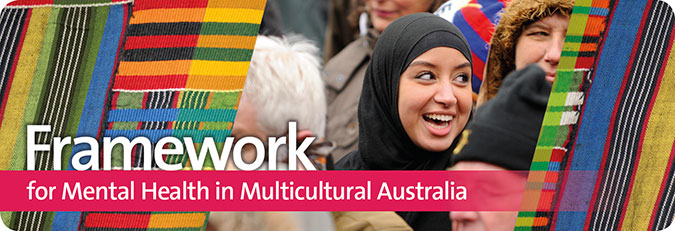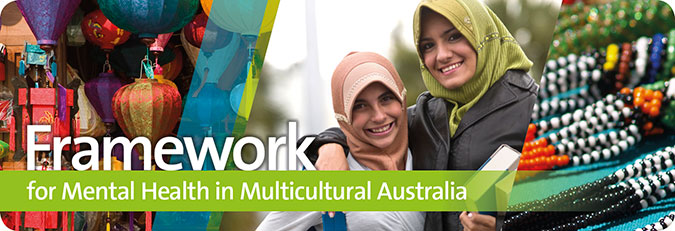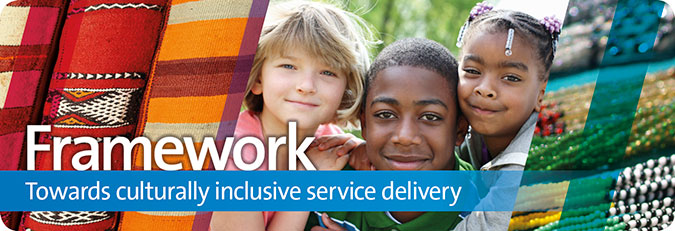Key concept 1
Cultural responsiveness
Cultural responsiveness is an integral component of recovery-oriented service delivery and a critical consideration in improving the quality and safety of mental health services.
The new national Framework for Mental Health in Multicultural Australia: Towards culturally inclusive service delivery (the Framework) helps mental health services achieve greater cultural responsiveness through an ongoing process of quality improvement. This is an important concept to enable mental health services to more effectively respond to the mental health needs of their local culturally diverse communities.
Why it is important to be a culturally responsive service?
Greater capacity to respond to Australia's growing cultural diversity
As Australia’s cultural diversity continues to grow, mental health services need to understand and respond to changes in the local communities they serve. These changes include the arrival of immigrants and refugees whose values, norms, traditions, religious beliefs and social structures may vary from those of the broader Australian culture.
Cultural beliefs about what constitutes mental illness and how to respond to it will affect how immigrants and refugees seek help and whether or not they will choose to access services. Understanding mental illness as a health problem that requires medical treatment is a western concept that can seem strange or even threatening to some people from culturally and linguistically diverse (CALD) backgrounds.
To respond to the needs of their culturally diverse communities mental health services need to firstly understand who their CALD communities are, and then engage with them in partnership to deliver mental health services that are culturally responsive.
Australia's growing cultural diversity
- The number of overseas-born Australians has increased from 23% of the total population in 2006, to 26% in 2011. Numbers of second generation migrants with at least one parent born overseas are significantly higher (43% in 2011 Census).
- The number of Australians who speak a language other than English increased from 16% of the total population in 2006, to 19% in 2011.
- The number of languages spoken in Australia has increased from 160 in 1996, to over 200 in 2011.
- Australia has experienced significant increases in the number of immigrants coming from non-English speaking countries between 2001 and 2011. For example, immigrants from India have increased by 200,000 people, and immigrants from China have increased by 176,200.
Australian Bureau of Statistics, 2012
Improve access
The National health and Medical Research Council of Australia (2005) has recognised that:
"All Australians have the right to access health care that meets their needs. In our culturally and linguistically diverse society, this right can only be upheld if cultural issues are core business at every level of the health system – systemic, organisational, professional and individual".
People from CALD backgrounds have lower rates of voluntary mental health care when compared with the general population. They are over-represented in the group of people who are treated involuntarily or admitted for acute inpatient care. This suggests that CALD populations are more likely to access mental health care only when they become acutely and seriously unwell and are more exposed to adverse quality and safety risks.
Some of the barriers for CALD people in accessing mental health services include:
- A lack of knowledge or understanding about mental health services
- A stigma related to mental illness or seeking help
- Concerns about confidentiality
- Language barriers
- Cultural misunderstandings
- Previous unfavourable or negative experiences with health or other services
- Concerns about being heard, understood or respected, especially in relation to their own explanation of their problem or issue.
Some of these barriers need to be addressed by changes in how mental health services operate while others require engaging and working with CALD communities to increase knowledge, decrease stigma and improve access.
Enhance equity, quality and safety
People from CALD backgrounds are more likely to receive poorer quality care than the general population, which may be partly due to language barriers and cultural differences between health care providers and consumers. These differences can result in miscommunication and misunderstanding leading to errors and incidents with potentially serious clinical consequences, sometimes even death.
Racism and discrimination from health care providers (intended or otherwise) also contributes to negative experiences for CALD consumers and can result in consumer mistrust and dissatisfaction with mental health services. This can lead to lack of compliance with treatment, disengagement from care and reduced willingness to access services in the future. All these factors can contribute to poor mental health outcomes.
What are the benefits of being a culturally responsive service?
When mental health services have good partnerships with the culturally diverse communities they serve, have addressed access issues by reducing barriers and improve equity of service delivery, they become more culturally responsive.
A culturally responsive mental health service can deliver:
- Better health outcomes for CALD consumers, carers and their families
- Greater access and equity for CALD consumers, carers and their families
- Quality and safety, and reduced rates of adverse incidents
- Better communication and understanding resulting in clearer expectations and improved compliance with treatment
- Higher consumer mental health literacy leading to appropriate help-seeking behaviour
- Greater consumer satisfaction and increased levels of trust, attendance and re-admission rates
- More efficient use of resources leading to cost savings
- Compliance with national standards and accreditation requirements
- Improved public perceptions of the mental health service
How can mental health services become more culturally responsive?
The evolution of a more culturally responsive mental health service requires organisational commitment and leadership, as well as an acknowledgement that it is an ongoing process. It cannot be viewed as a simple completion of a compliance activity with a fixed end point.
The Framework for Mental Health in Multicultural Australia: Towards culturally inclusive service delivery (the Framework) is a national Framework that has been specifically designed for Australian mental health services under the current policy context.
The purpose of the Framework is to improve service delivery for consumers and carers from CALD backgrounds, ensuring equitable outcomes in access and quality of care. The Framework supports local continuous improvement practices and enables services to respond to the changing population demographics in their local catchment areas. Implementation of the Framework will not only assist services to fulfil current accreditation requirements, it will also facilitate safer and better quality services.
Useful readings
Australian Bureau of Statistics. (2012). Cultural Diversity in Australia. Canberra: Australian Bureau of Statistics.
Department of Health. (2009). Cultural responsiveness framework – guidelines for Victorian health services.
Melbourne: Department of Health, Victorian Government.
National Health and Medical Research Council. (2005). Cultural competency in health: A guide for policy, partnerships and participation. Canberra: National health and Medical Research Council.
Pirkis, J., Burgess, P., Meadows, G., & Dunt, D. (2001). Access to Australian mental health care by people from non-English speaking backgrounds. Australian and New Zealand Journal of Psychiatry, 35(2), 174-182.
 Key Concept 1 - Cultural responsiveness (215 KB)
Key Concept 1 - Cultural responsiveness (215 KB)
Previous Page











